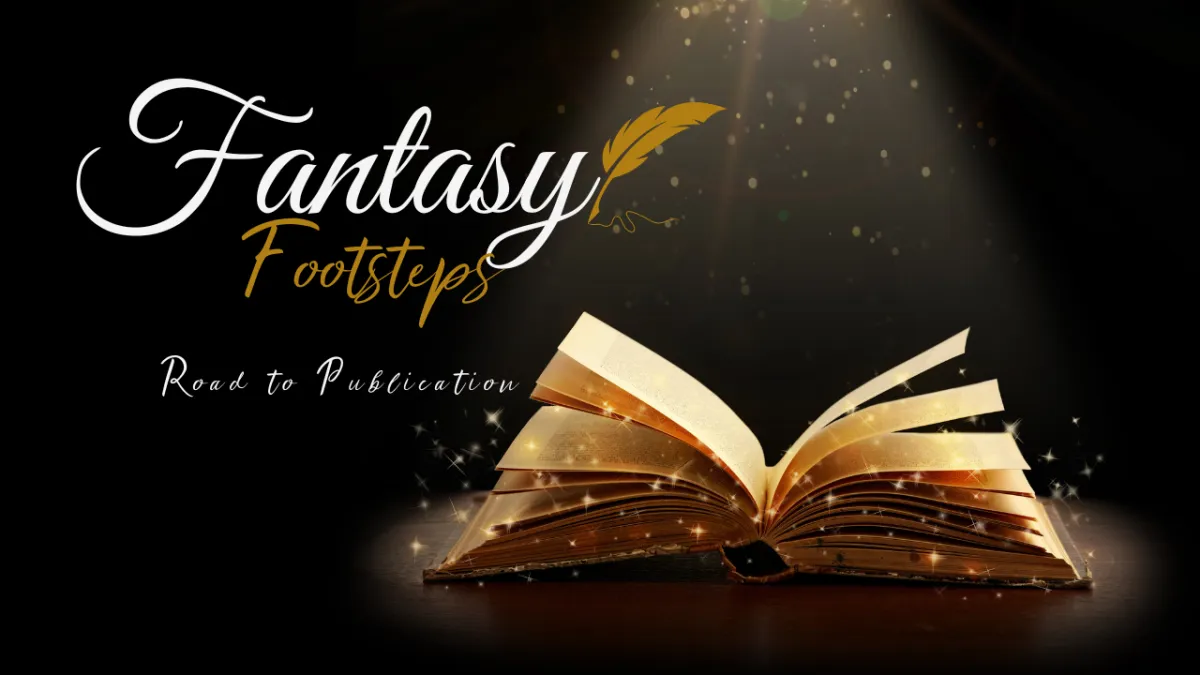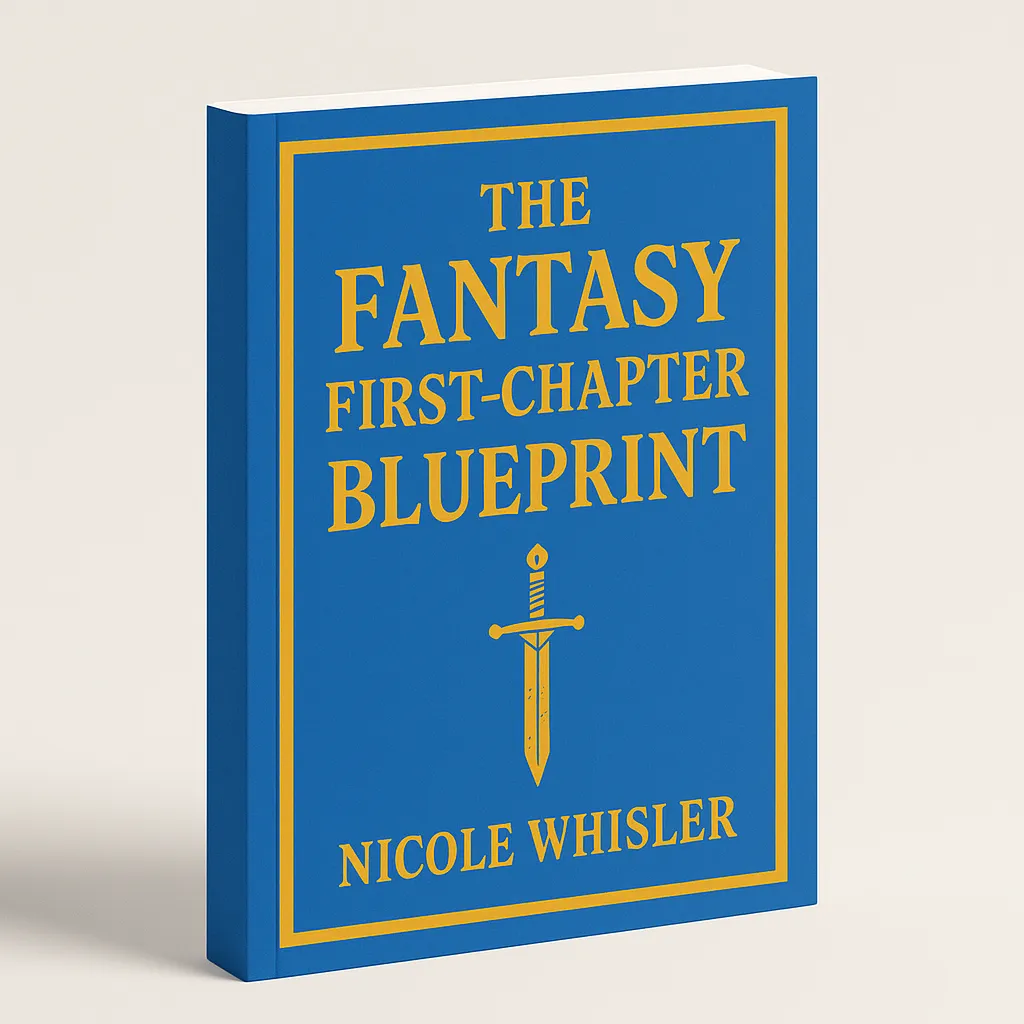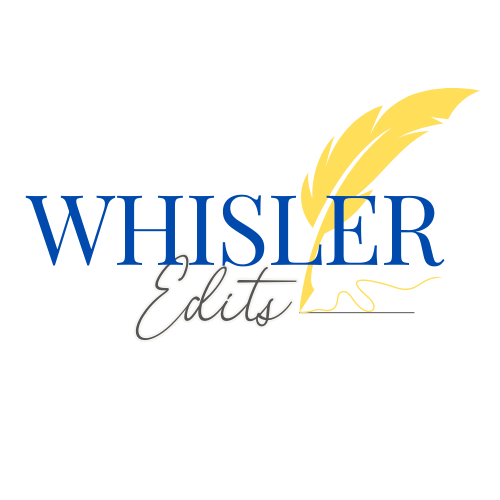The Fantasy First-Chapter Blueprint
Your first chapter is your one shot to hook an agent or a reader. Don't let the 7 deadliest mistakes land your manuscript in the rejection pile. This free 7-day email course gives you the step-by-step blueprint to avoid them and craft an irresistible opening.

Your Novel Matters ...
Looking for the right book coach for your fantasy novel?
Are you a fantasy writer …
… struggling to convert the vivid scenes of your fantasy novel from your imagination to the page?
… stuck in a loop where you constantly rewrite your opening pages?
… worried your story won’t resonate with your readers?
What if I could show you the exact steps week to week that would take you from brainstorming and drafting to revising and publication?
I specialize in developmental editing and book coaching for writers of fantasy novels—writers who value the craft of storytelling and wish to create stories that resonate.
My Services
Develop Your Ideas
Fantasy Footsteps: Road to Publication

I’ll let you in on a secret. All you need to succeed as a writer are three things:
A Roadmap: Illuminate your path with a step-by-step guide, ensuring you achieve your writing goals every week. From outlining to publishing, every stage of your journey is mapped out for success.
Mindset Mastery: Learn how your thoughts control your outcomes in your writing. Overcome self-doubt and unearth the confidence that will bring your unique ideas to life on the page.
Personalized Support: Prepare for comprehensive assistance, real-time accountability, and feedback tailored to your needs. From brainstorming sessions to final publication, you'll have a dedicated ally guiding you every step of the way.
With these three pillars, you'll unlock the potential to:
Craft a captivating story that enthralls readers from the first page to the last.
Develop complex characters and immersive worlds that resonate deeply with your audience.
Navigate the complexities of plot twists and pacing, keeping readers hooked until the final chapter.
Receive specific guidance on refining your scenes so that readers root for your protagonist.
Overcome writer's block and stay motivated throughout your writing journey, ensuring consistent progress.
Transform your rough draft into a polished, professional manuscript ready for publication.
Are you ready to turn your fantasy novel from a mere vision into a masterpiece that captures hearts and minds?
Join Fantasy Footsteps: Road to Publication and begin your author journey with everything you need to write a story that works.
Don't let your story remain trapped in your mind—bring it to life with me!
If you’re thinking, “Yes, please! Tell me what to do!” , I’d like to invite you to work one-to-one with me to finish your novel and write a story that works. Join my book coaching program designed specifically for fantasy writers—Fantasy Footsteps: Road to Publication.

Discover Helpful Tools
Resources For Writers
Here you will find some of my favorite resources for writers.
Add these books, podcasts, websites, and other resources to your writing toolbox to augment your writing at any stage.
Join My Free, Private Facebook Group
Finish My Fantasy Novel: Write & Revise My Best Book in 6 Months
In the group, I go live weekly with writing tips. The group is also a platform for writers to support each other and share their wins and progress.
Live training schedule:
1st Tuesday of the month: Free critique for someone in the group!
2nd Tuesday of the month: Writing sprint with fellow writers
3rd Tuesday of the month: Live training on a specific topic
4th Tuesday of the month: Interview with an author or marketing/business expert


Improve Your Craft
Writing Advice Blog
As a developmental editor and book coach, everything I post is designed to help you build your creativity, strengthen your prose, and explore new avenues in your writing. The opinions in each post are my own, but many are inspired by ideas from established authors and editors who excel in their fields.
Rely on my blog for clear and specific writing advice, motivational tips and grammatical aid, and interviews with experts!
Hi! I'm Nicole.
I’m a Developmental
Editor & Book Coach for Fantasy Writers.
Like you, I'm a writer. I understand the mental and emotional ups and downs of storytelling. Don't let resistance win! Recognize the value of good advice plus hard work.
My approach to novel writing is multifaceted. For a deeper understanding of my process and style, take a look at some of my favorite craft-of-writing books in my Resources section.
What can I say about myself? I read, I write, I read about writing, and I write about reading. It never gets old to me.

See what writers like you are saying . . .

Nadir Shirazi
“I’ve been stalling on my Islam-inspired sci-fantasy series for 10 years. But within 10 minutes of starting Nicole’s program, I started writing again."

Amanda Emerick
“I can’t recommend Fantasy Footsteps enough to writers who are legitimately looking to polish their craft, write, and eventually publish their novel."

Trinity Cunningham
“I loved discussing my story with Nicole. She provided me with invaluable insights I never would have considered on my own."
Latest on the Blog

You will find no pictures of kittens here. No images of favorite dessert recipes, snapshots of my recent vacations, videos of puppies playing the piano (although I do love dogs), or YouTube clips of monkeys stealing people’s sunglasses.
I’m genuinely sorry if that disappoints you.
Instead, you can rely on my blog for clear and specific writing advice, motivational tips, grammatical aid, and author/editor interviews.
As a developmental editor & book coach, everything I post is designed to help you build your creativity, strengthen your prose, and explore new avenues in your writing. The opinions in each post are my own, but many are inspired by ideas from established authors and editors who excel in their fields.
Some of these tips might be just what you need to hear. Others might not work for you personally, and that’s okay.
Apply the tips that fit your personality and writing habits, and feel free to adapt or ignore the others. For further questions and comments, you can email me or reach me through my Contact page.

A Writing Mindset That Thrives in Any Circumstance
Discover in this post …
the real problem that’s keeping you from meeting your writing goals.
a powerful mindset model that will set you up for success despite your life circumstances.
a practical way to shift your mindset daily to achieve your desired writing results.
Got Writing Problems?
As writers, we’re kings and queens of making excuses that explain why we’re not writing:
"Every time I sit down to write, something else comes up that requires my attention. I never get very far. Guess it’s not the right time for me to write this book.”
"When I get out of grad school, then I’ll have time to write.”
"Once I find a more stable job, I’ll have peace of mind so I can buckle down and make this happen."
"I need to do tons more research and worldbuilding before I can start my story. I want to do it right.”
Can you relate to any of those thoughts? Do you spend more time thinking about your writing goals and dreams than actually writing?
If you see yourself in the above excuses, don’t worry—that’s why I’m writing this post. And I’m not going to highlight the problem you’re experiencing without offering a solution.
But to get to that solution, let me offer a statement you might find controversial:
If your main goal is to make progress on your manuscript, it’s not your situation that’s keeping you from writing.

It’s your thoughts.
It’s all too easy in the writing world to blame outside circumstances for our lack of progress. We convince ourselves that when everything magically aligns, we’ll charge ahead and produce work consistently, finally getting to the point where we can share it with an eager readership.
But in truth, 99% of the time, it’s up to us to create the results we want in our writing. And those results aren't dependent upon what's happening in our lives.
Sometimes we face overwhelming adversities, such as the death of a family member or chronic illness. I’m not discounting the extremes. But the majority of the time, we’re simply wading through everyday life, facing regular challenges and setbacks just like every other writer.
All too often, failing to move forward in our manuscript is a direct result of what we’ve told ourselves. We get caught up in our thoughts, and those specific thoughts—which we might or might not be aware we’re thinking—produce feelings and actions in us that don’t align with the results we want.
Now, I mentioned a solution a few paragraphs up. When our thoughts and actions are unaligned, it doesn’t mean our situation is hopeless. On the contrary—we just need to learn to resolve this lack of alignment! When we draw awareness to our thoughts, and we consciously change the stories we’ve accepted as fact, we’re able to move forward in our writing no matter our situation in life.
How does this work, you might ask?
Let me show you.
The Mindset Model That Will Set You Up for Success
This isn’t a hypothetical strategy I’m offering, one I’m crossing my fingers might possibly help someone. This is a proven mindset model used by tens of thousands of people looking to solve their day-to-day problems. It sheds light on specific causes and effects in a person’s life and reveals how our thoughts create our results—and how we have more control over those results than we might think. It’s similar to other mindset models in existence, but it’s the one that resonates with me most.
Our thoughts hold an incredible amount of power—but it’s up to us to recognize this concept and use it to our advantage.
How do you know if you’ll benefit from the model I’m about to describe? This is for you if you …
want to write more consistently.
want to gain freedom from self-doubt, imposter syndrome, or fear.
want to build trust in yourself as a writer.
are open to new ideas and committed to self-improvement.
This is not for you if everything is going perfectly for you as a writer and you have no problems whatsoever. If that’s you, awesome—keep rockin’ it!

I integrated this mindset model into my life years ago. The attitude I’ve adopted through this model is the biggest item responsible for the success I’ve achieved in the book coaching business I created. Little by little, I took the steps needed to achieve my vision, and now I have clients I adore, writers I’m eager to serve when I wake up each day.
One step at a time, you can finish your manuscript and share it with the world, and you can wake up each day excited to connect with the readership you’ve built.
Here’s how this mindset model (CTFAR) works. First, jot down these terms and examples so that soon they’ll become second nature to you as you go about your day:
C stands for Circumstance. Your circumstance is a neutral fact that has no positive or negative value until you yourself assign it one. It's whatever’s happening in your life at the moment (e.g., “I have responsibilities toward my family but also have a story in me I want to write”).
T stands for Thought. Your thought is a single sentence in your head that you tell yourself about your circumstance (e.g., “My family's needs are so pressing that I don’t have any time to write”).
F stands for Feeling. Whatever you’re thinking about your circumstance will produce a specific feeling within you (e.g., helplessness or anxiety).
A stands for Action. You’ll take action from the feeling you’ve identified in the previous step (e.g., you’ll stop writing because you feel helpless, as if you have no time whatsoever for your story).
R stands for Result. Your result in this scenario is that you won’t accomplish any writing. (By the way, if you’ve done the model correctly, your initial thought will match your result. Look back at the sample thought above. You told yourself you had no time to write, and what do you know? You didn’t write.)
The definitions and examples above make up what’s known as an unintentional model—in other words, the natural pattern of what will happen if you go about your day without bringing any awareness to your thoughts. Notice that in this scenario, you didn’t end up writing.
Let’s look at another scenario, an intentional model rather than unintentional. (Spoiler Alert: This version has a happy ending.)
In an intentional scenario, your model could play out like this:
C (Circumstance) - “I have responsibilities toward my family but also have a story in me I want to write” (Notice your circumstance doesn’t change in the intentional model. It's a neutral fact that will always stay the same.)
T (Thought) - “Both my family and my writing are part of me. I can allot some time to my family and some time to my writing without losing either part of myself.”
F (Feeling) - Excitement and motivation to create a plan in which the above thought can come true
A (Action) - Devise and follow a simple plan that allows you to spend some time with your family and some time writing.
R (Result) - For the first time in months, you get words on the page!
See how in each case, the thought matches the result?
When you tell yourself it’s impossible to write and spend time with your family, you don’t end up writing. When you tell yourself you can do both, you make progress in your manuscript.
It's a self-fulfilling prophecy—but it’s not magical. It’s intentional.
The next time you tell yourself a story about your circumstances, such as “I would love to be a writer, but that’s a long way off for me,” redirect your main thought to change your result.
It takes practice to address these thought patterns in your life. It’s not an overnight fix. It’s a day-by-day, purposeful activity.
And of course, it’s not always easy to remember to coach yourself in the heat of the moment. But if you want results, it’s entirely worth it.
Let's Get Practical

Here’s how you can coach yourself using the model on your own. I recommend writing down a sentence for each step rather than holding everything in your head:
Step 1 - Identify a problem you’re encountering.
This usually isn’t hard. We’re typically aware of the problem, which often revolves around our emotions. Examples include …
“I’m stuck in the middle of this chapter.”
“I’m feeling like a terrible writer.”
“I’m so unmotivated to write right now.”
Step 2 - Work backwards to pinpoint the specific thought you’re having around the problem.
It might take a bit of time and effort to clearly identify what you’re thinking, but don’t skip this step—it’s essential to the process. Examples that correspond with the problems listed in Step 1 are …
“Something is wrong with this chapter. It feels off.”
“I just read a book by one of my favorite authors. It was soooo much better than my own writing. I have such a long way to go.”
“Everything else just seems so much more fun! I could read a book or watch a movie. There’s no pressure involved there, just fun. Why would I write when it doesn’t sound like fun?”
Step 3 - Once you’re clear on the thought that’s producing your undesired feeling, coach yourself around the problem by selecting a different thought!
Here are some examples of new thoughts that might serve you better (still corresponding with the numbers above):
“If I can pinpoint what’s wrong with this chapter, I can fix it—or shelve it as a ‘second draft problem’—and move on.”
“It’s inspiring to read books by my favorite authors because it shows me what’s possible. These authors’ first drafts may even have looked similar to mine.”
“I wonder if there’s a way to make my writing fun right now. Could I alter my strategy to make it lighter and take away some pressure I’m feeling?”
Step 4 - Dedicate some time to focus on the new thought, which will change your emotions, actions, and results.
Put the new thought somewhere you’ll see it daily. Write it on your bathroom mirror, say it out loud ten times a day … whatever guarantees you’ll pay attention to it.
Don’t stop at Step 3, telling yourself, “I agree, I should shift my mindset to think in that way—it would be good for me” but never actually doing it! The writers who follow through and remain committed to developing this new mindset are the ones who break past their plot difficulties, self-doubts, or lack of momentum and finish their books.
Change the story you’re telling yourself to take ownership of your storytelling. Imagine the writer you want to become, get deep into that writer’s mind, and ask yourself, “How would that successful writer think/feel about this problem?” Then coach yourself to think the same!
Do you currently coach yourself around your writing challenges, or do you tend to experience your writing life as a series of ups and downs? How would it change things for you if you committed yourself to pushing ahead no matter what, resolving problems rather than pretending they don’t exist? What would happen if your writing life became nonnegotiable for you? If my post resonated with you today, or if you have questions about the CTFAR mindset model, email me at [email protected]. I’d love to hear from you!
Do you want to learn how to write a story that makes your target readers stand up and cheer? If you’d like support from A to Z (from brainstorming to drafting to revising to publication), book a Discovery Call with me to see if you’re a good fit to join my book coaching program, Fantasy Footsteps: Road to Publication. And if you haven’t done so already, grab your Free Guide on how to hook readers from your story’s start!

Capture Your Readers from Your First Scene
Get my exclusive blueprint—7 Mistakes to Avoid in Your Fantasy Novel’s Opening. Start your fantasy novel right!
Are you worried you've failed to establish a bond between readers and characters in your first chapter? Do you wonder if you've bogged readers down with your worldbuilding? Do you sometimes overlook essential conflicts? Many readers will put your book down if it doesn't grab their attention right away, so it's vital to evoke powerful emotions from readers as early as possible.
Don't let these common mistakes rob your story of its magic and momentum. Save your precious time and energy by ensuring you hook readers from the start. Grab your guide now and check your opening against these common missteps!
(You will also receive monthly writing advice, updates about my free live trainings, and direct access to replays. Unsubscribe anytime.)

